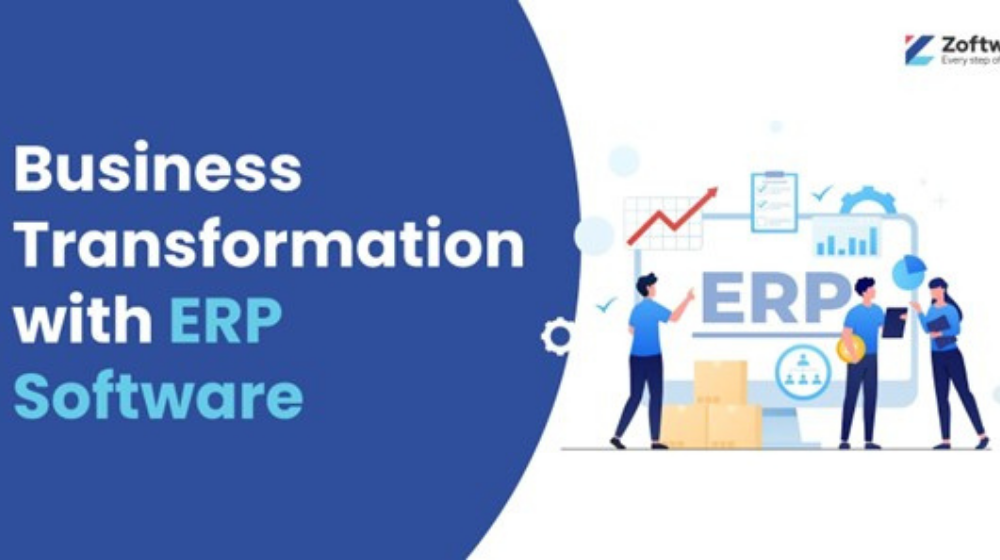Around 95% of businesses saw improvement after implementing ERP Software.
This result shows the significant impact of ERP Software on businesses and their operations. This explains how the right ERP Software can transform your business. There are many success stories behind ERP Business transformation.
In today’s digitally dynamic business environment, businesses seek productive resources to streamline their operations effectively. One such resource is ERP Software.
So, in this blog, you will understand ERP Software benefits and ERP Business transformation. But to fully understand and utilize ERP Software, one must understand what ERP is and its core functionalities.
Let’s get started.
Definition of ERP Software:
Enterprise Resource Planning (ERP) software manages and automates core business processes by integrating various functions into a single system. This software centralizes data, facilitating seamless information flow across different departments.
Thereby enhancing organizational efficiency and decision-making. ERP systems are designed in such a way that it can be scaled and adapted. It ensures that it can meet the evolving needs of a business, regardless of its size or sector.
Core Functions of ERP Software:
- Financial Management: Manages economic activities, including accounting, general ledger, bills payable, invoices receivable, and financial reporting.
- Supply Chain Management: Overlooks the entire supply chain, encompassing procurement, inventory management, order processing, and logistics.
- Human Resources Management: Streamlines employee-related processes from hiring to retirement, including payroll, benefits, and performance management.
- Customer Relationship Management (CRM): Helps in managing interactions with customers, including sales, commerce, customer assistance, and retention techniques.
- Project Management: Assists in planning, executing, and monitoring project tasks, resources, and timelines.
- Manufacturing and Production: Manages manufacturing processes, including planning, scheduling, and quality control.
- Data Analysis and Reporting: Provides tools for analyzing business data and generating insightful reports for strategic decision-making.
- Compliance and Risk Management: Ensures business compliance with legal standards and helps identify and manage various risks.
Importance of Implementing ERP Software
It is essential to understand how to implement ERP Software. There is a difference between ERP software’s benefits and importance. ERP Software’s importance helps in understanding the pitfalls and how to achieve better results. To know more, read about ERP Software Implementation.
- Streamlined Operations: ERP systems integrate various business processes, leading to more efficient and streamlined operations. This integration reduces process time and increases productivity by automating routine tasks.
- Enhanced Data Accuracy and Decision Making: ERP provides accurate, real-time information with centralized data storage. This aids in making informed decisions, as managers can access up-to-date data from all departments.
- Cost Reduction: ERP systems can significantly reduce operational and administrative costs by improving efficiencies. They help identify and eliminate inefficiencies, leading to cost savings.
- Improved Customer Service: ERP systems often include CRM components that help better understand and manage customer needs, thus enhancing customer satisfaction and loyalty.
- Scalability: As businesses grow, ERP systems can adapt and scale accordingly. They can handle increased data and complex operations, making them ideal for growing businesses.
- Compliance and Risk Management: ERP helps maintain compliance with regulatory standards and enhances risk management by providing comprehensive oversight of business processes.
- Enhanced Collaboration: By providing a single source of truth, ERP systems improve collaboration within the organization, as employees across different departments have access to the same information.
- Competitive Advantage: Implementing ERP can provide a significant competitive advantage by optimizing business processes, improving efficiency, and enabling faster response to market changes.
How ERP Software Can Transform Your Business Operations
ERP software benefits businesses in many ways. Entrepreneurs are also implementing top ERP Software trends to utilize it fully. But how it helps you transform your business operations is the key point. Especially the manufacturing issues raised in operations can be solved by Cloud ERP. So here are ten ways to transform your business operations:
- Integrated Business Processes: ERP software unifies various business processes, creating a cohesive operational framework. This integration spans critical areas such as finance, human resources, manufacturing, and supply chain management. The ERP system linking these diverse functions ensures a seamless flow of information and processes across the organization.
For instance, a change in the manufacturing schedule automatically updates inventory levels and financial forecasts, eliminating silos between departments. This interconnectedness means that information entered in one department is immediately available across the organization, fostering a more collaborative and efficient environment.
- Improved Efficiency: The automation capabilities of ERP software play an important role in enhancing business efficiency. These automating routine tasks, such as data entry, reporting, and order processing, reduce the need for manual intervention. This automation streamlines workflows, reducing time-consuming administrative tasks.
It allows employees to concentrate on strategic, value-adding activities. ERP software typically includes analytics and reporting tools, providing businesses real-time insights into their operations. These insights enable managers to identify areas of inefficiency and make informed decisions to optimize processes.
- Improved Decision-Making: ERP software enhances decision-making in several vital ways. Firstly, it offers real-time data access. Managers and leaders no longer need to wait for end-of-day reports or monthly summaries; they can access up-to-the-minute data whenever required. This immediacy allows for quicker responses to emerging trends or issues. This integrated perspective is crucial for strategic planning, as it eliminates the silos of information that can hinder comprehensive understanding.
- Cost Savings: ERP software contributes to cost savings through several mechanisms. Initially, it streamlines processes, reducing the need for manual tasks and the potential for human mistakes, which can be costly. This increased efficiency often lowers labor costs, as tasks that took hours can now be done in minutes. Additionally, ERP systems provide detailed insights into financial performance, highlighting areas where costs can be reduced.
- Scalability: The scalability of ERP software stands out as one of its most significant advantages. This feature allows the software to adapt and grow in tandem with your business, accommodating new processes, additional users, or expanded data requirements without needing a complete system overhaul.
For instance, if your business grows its product line or enters new markets, the ERP system can incorporate these changes seamlessly. This scalability ensures that your investment in ERP remains viable and supportive, regardless of how your business evolves. It eliminates the need for frequent replacements or extensive modifications to your core systems.
- Improved Customer Service: Enhanced customer service is a direct ERP Software benefit of implementing ERP software. This improvement stems from the system’s ability to centralize and streamline access to customer-related data. Sales and customer service teams can access comprehensive customer histories, including past transactions, preferences, and interactions, all from a single platform. This unified view enables them to provide personalized and efficient service.
For example, if a customer contacts support, the representative can quickly pull up the customer’s entire history, leading to more informed and tailored interactions. This level of personalized attention significantly boosts customer satisfaction and loyalty.
- Compliance and Risk Management: ERP software is pivotal in enhancing a business’s ability to manage compliance and risk. In industries governed by strict regulations, ERP systems are instrumental in tracking and reporting critical data, ensuring adherence to legal and industry-specific standards.
They often come equipped with tools and features to monitor compliance, flagging potential issues before they escalate. This preemptive approach is vital in industries like healthcare, finance, and manufacturing, where regulatory compliance is a legal requirement and an essential component of operational integrity.
- Mobility and Flexibility: In today’s dynamic business environment, mobility and flexibility are crucial, and modern ERP systems are designed to cater to such needs. With mobile capabilities, ERP software allows employees to access vital business information and perform critical functions from anywhere, breaking the traditional confines of office walls. This flexibility enhances productivity, as tasks that once required presence in the office can now be executed remotely, ensuring business continuity and operational efficiency even in situations like travel or remote work setups.
- Enhanced Collaboration: ERP systems significantly boost collaborative efforts across a business. They ensure that every department works with consistent, up-to-date information by centralizing data storage and access. This uniformity is vital in coordinating activities, especially projects involving multiple departments. Enhanced collaboration, facilitated by an ERP system, ultimately leads to more innovative solutions and efficient problem-solving, as employees can quickly draw on a wealth of shared knowledge and insights.
- Data Security and Quality: Implementing an ERP system can significantly bolster data security and enhance the quality of information within an organization. With centralized data management, the risk of data inconsistencies and errors in decentralized systems is significantly reduced. This centralization ensures that all departments access the same, up-to-date data, leading to more accurate and reliable business insights.
ERP Software shows a drastic impact on business performance. And that’s why choosing a suitable ERP becomes difficult. One should be careful and understand how to select the right ERP software for one’s business. Also, investing in resources should be time and cost-saving. So that’s why we have introduced the right partner for your ERP Software hunt – Zoftware.
Zoftware is a software discovery platform located in the Middle East. They streamline the process of finding the ideal ERP software by aiding businesses in outlining their needs and comparing different software options. They make well-informed choices based on genuine user reviews.
Conclusion
With helping partners like Zoftware, you can ease your ERP Software search and focus on your other primary tasks. Zoftware will help you select the correct software in your region without hassle. Remember ERP Software’s importance and how you can transform your business with it. So, explore different ERP software and their features before you select the one for you.
Register today at Zoftware to discover the ideal software solution for your business.





